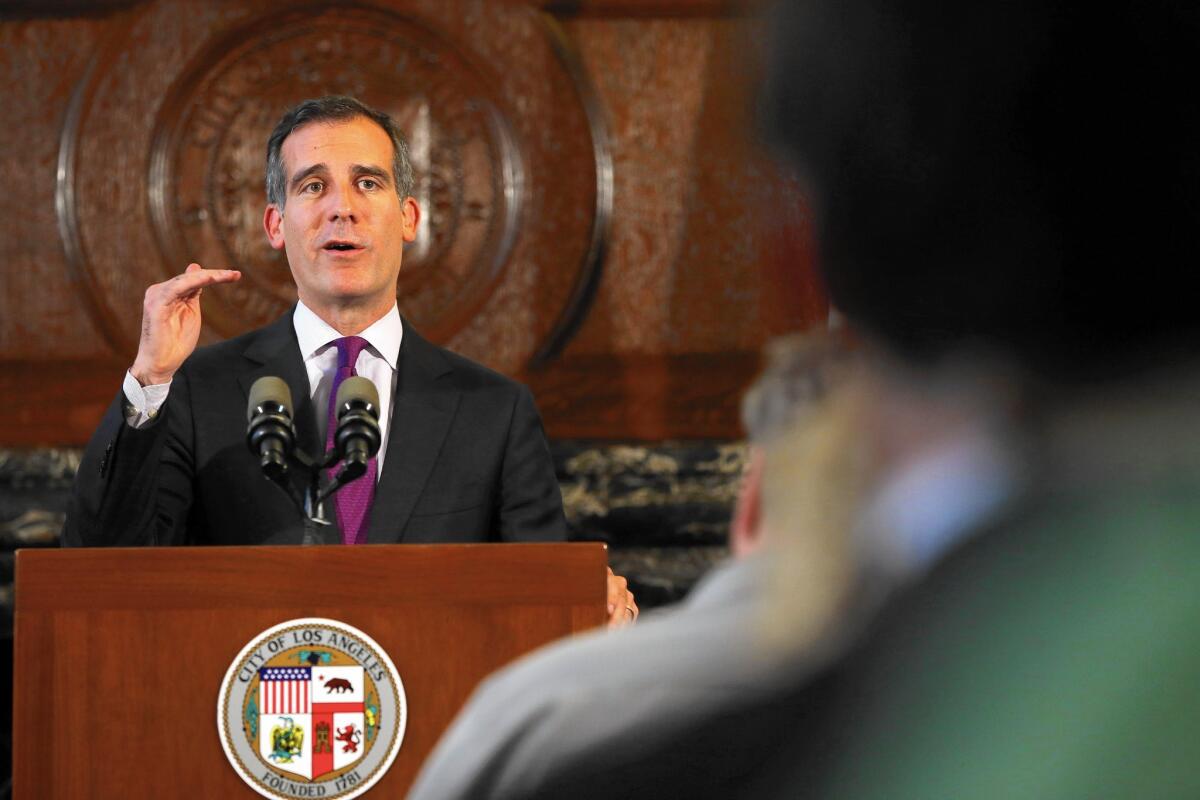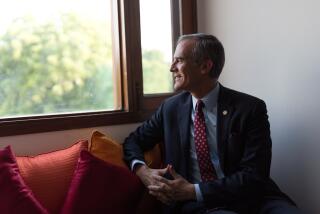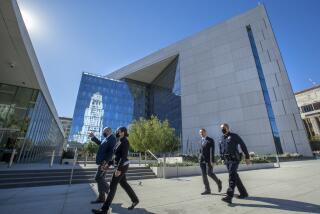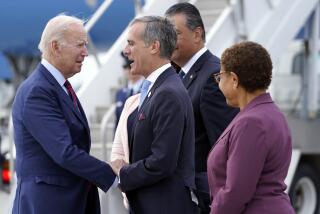Some criticize Garcetti’s low-key approach to police shootings

- Share via
Mayor Eric Garcetti met with Ezell Ford’s mother at First AME Church. It was a historically resonant setting for a talk about Ford, a mentally ill black man killed by police. Founded in the late 19th century by some of Los Angeles’ earliest black residents, the church stands amid streets laid waste in riots that followed the 1992 acquittal of the officers who beat Rodney King.
“It was a really beautiful meeting between the two of us, I think,” the mayor told reporters on Tuesday after speaking with Tritobia Ford. “She was able to just talk about what it felt like to have lost her son and her quest for justice for him.”
Ford later gave her own verdict on her time with L.A.’s top elected official: While she was grateful for the mayor’s effort, she said, the meeting came “10 months late.” Her son was shot to death by officers in South L.A. last summer. Only after she criticized Garcetti on television last weekend for his inattention to the case had he personally reached out to her.
The encounter inside First AME was characteristic of Garcetti’s challenges in recent weeks, as he has tried to calibrate his reactions to two high-profile police shootings of young black men.
The mayor is known for using his bully pulpit as leader of America’s second-largest city with more restraint than some of his outspoken predecessors. His supporters say he eschews publicity for the more meaningful work of crafting policy and back-channel coalition building.
But at a time when officers’ killings of young black men have tested big-city mayors across the country, some question how well Garcetti’s low-key style can be adapted to the combustible politics of race and policing.
Last month, one of the city’s top homeless services officials faulted the mayor, along with LAPD Chief Charlie Beck, for not showing up at an emotionally charged community meeting called in response to the fatal police shooting of Brendon Glenn, an unarmed 29-year-old who lived on the streets in Venice.
“Where is the mayor? Where is the chief of police?” Los Angeles Homeless Services Authority Commissioner Mike Neely said at the meeting. “I don’t think they realize this person was someone people really cared about.”
Last week, on the eve of the city Police Commission’s ruling on whether deadly force was justified in the Ford case, the mayor flew to Washington, D.C. With a small group of demonstrators encamped outside Getty House, the mayoral residence, Garcetti tried to leave through a back entrance. He was confronted by activists who shouted at him as he peered out the passenger window of a black SUV.
“You always run,” one protester said. The episode was caught on video and broadcast on the nightly news.
Other urban leaders haven’t necessarily fared well with a more hands-on approach.
New York City Mayor Bill de Blasio alienated his police force with his forceful expressions of sympathy for Eric Garner, an unarmed black man who died after an officer put him in a chokehold. Baltimore State’s Atty. Marilyn Mosby was attacked for political opportunism when she swiftly filed charges against six officers allegedly involved in the death of Freddie Gray.
Garcetti, according to some longtime observers of L.A.’s political scene, risks erring in the opposite direction.
In a city with a smoldering legacy of civil unrest, voters prefer mayors who can summon a commanding presence in times of trouble, said veteran Democratic strategist Darry Sragow.
Former Mayors Antonio Villaraigosa and Richard Riordan were sometimes chided for hogging the spotlight, but were rewarded with second terms in office.
“It’s obvious that L.A. is a very big and complicated place, and there’s an expectation on the part of the people who live in the city that the mayor is going to play a visible role and have a guiding hand,” Sragow said. “This is a city with a lot of underlying tensions and problems that could rise to the surface without that kind of strong hand.”
Arnie Steinberg, a former Riordan advisor, said Garcetti’s on-camera encounter with the protesters outside his home showed that he had not yet mastered the art of projecting strength in moments of controversy.
“It’s a counterproductive visual to be seen as evasive and not confronting things forthrightly,” Steinberg said.
Fernando Guerra, a registered lobbyist and director of the Center for the Study of Los Angeles at Loyola Marymount University, took a different view of the mayor’s low profile. He said he didn’t think Garcetti was too detached from the Glenn and Ford shootings, but had wisely focused on policy reforms — such as equipping all officers with body cameras and increasing funding for community policing programs — to address the police department’s underlying problems.
“You could spend all four years, every single day, reacting to events in Los Angeles, and not get a single thing done,” Guerra said. “I think he’s got a systematic approach to public safety. He’s way ahead of most police departments with body cameras. He’s way ahead of most police departments with community relations.”
On Tuesday, after the police commission ruled that one of the two officers who shot Ezell Ford was not justified in using deadly force, Garcetti addressed criticisms of his perceived lack of focus on the case.
The mayor, whose father served for eight years as L.A.’s elected district attorney, said he had not wanted to exert inappropriate influence over the civilian panel’s decision-making process.
“Short of an explosive situation in this city where I think it is my responsibility to speak out,” he said, “I’m the son of a prosecutor, and I’m going to let that system work and make sure that it is as clean as possible.”
Garcetti has sometimes taken an active role in the city’s responses to police shootings. When LAPD officials were accused of dragging their feet on releasing Ford’s autopsy several months after the August shooting, the mayor ordered them to disclose the report by the end of the year.
He has also cited the other inevitable demands — both professional and personal — on a mayor’s time. When he was asked on KNX-1070 radio why he had been a no-show at the May 7 Venice community meeting on Glenn’s death, which began at 6 p.m. and lasted about three hours, Garcetti said he had “previous commitments, and a family engagement that I could not break.”
He added, “That’s something as a father I won’t do in certain situations.”
His calendar, released by the mayor’s office in response to a request from the Los Angeles Times, provided more details about his activities that night. As residents and activists were shouting down a deputy police chief in Venice, Garcetti was holding a cocktail reception for the Los Angeles Consular Corps at Getty House, then attending the opening of Riot Games, an online gaming company that had relocated to L.A.
Officials who were at both events confirmed that the mayor attended. A spokesman for Riot Games said Garcetti arrived just before 8 p.m. and stayed for about an hour. The town hall meeting in Venice concluded shortly after 9 p.m.
In a brief interview last week, Garcetti said he had “a real, truthful obligation” related to his family, but acknowledged that it fell later in the night. He declined to specify on the record what it was, citing his family’s privacy. (The mayor and his wife, Amy Wakeland, have a young daughter and in the past have cared for foster children.)
Asked why he cited a family commitment that did not appear to take place at the same time as the Venice meeting as a reason for his absence, the mayor said the family obligation was “the final piece” of his scheduling conflict and that the reception for diplomats and the video-game company event were “commitments that I could not miss and would not have missed.”
He said he might not have chosen to attend the town hall gathering on Glenn’s killing anyway. “I don’t know that I necessarily would have gone to that meeting,” Garcetti said. “In retrospect, and talking to folks that were at that meeting, it wasn’t necessarily a productive or listening meeting.”
The mayor has also encountered concerns about his level of involvement in the Ford shooting.
Last Sunday, with the Police Commission’s determination on the case two days away, Ford’s mother expressed exasperation with Garcetti’s disengagement in an interview with KABC-TV. That night, the mayor telephoned her. His staff said he was unable to reach her, but left messages. (Mayoral aides did not finalize his meeting with Ford until Tuesday afternoon.)
Garcetti spent Monday in Washington, where he said he met with White House officials about potential federal funding for city programs. He returned to L.A. on an overnight flight. While he was gone, mayoral staffers tried to reach out to community leaders in South L.A.
Earl Ofari Hutchinson, president of the Los Angeles Urban Policy Roundtable, said one of the mayor’s aides called him Monday to ask whether he could participate in a meeting with Garcetti and other black community leaders the next day in advance of the Police Commission’s ruling. Hutchinson said he agreed and was told the mayor’s office would follow up with details.
Hutchinson said he never heard back, and the meeting never materialized. Instead, he said, Garcetti called him Tuesday morning and expressed his confidence that the panel would reach an appropriate decision.
Hutchinson said the mayor has regularly been in contact with him during the last two years about issues of importance to the city’s black leaders, an effort for which he said Garcetti deserves “a lot of credit.”
He also said phone calls are no substitute for a mayor’s face-to-face reassurance.
“It’s almost like a general: The good ones, they’re out front. They’re not in the line of fire, but the troops can see them,” Hutchinson said. “It cannot be done on the telephone. It cannot be done on the Internet. It cannot be done by carrier pigeon. You have to be there.”
Times staff writers Kate Mather, Gale Holland, Angel Jennings and Christi Parsons contributed to this report.
More to Read
Sign up for Essential California
The most important California stories and recommendations in your inbox every morning.
You may occasionally receive promotional content from the Los Angeles Times.














